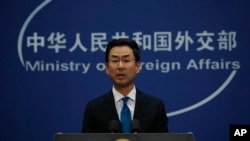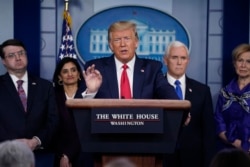The Chinese government has passionately defended the World Health Organization’s decision to stop using geographic references for the novel coronavirus such as “Wuhan pneumonia” or the “Wuhan virus” and instead refer to it as COVID-19.
But a new notice from Chinese authorities that includes Africa in the name of a virus has some accusing the government of double standards.
China’s Ministry of Agriculture and Rural Affairs recently issued a notice calling for strict quarantine of horses on China’s southwestern border to prevent African horse plague, which is officially known as African horse sickness (AHS).
In the notice, they warned about a deadly African horse sickness that occurred in Thailand at the end of March, and noted that the risk of it spreading into China is high.
The Ministry of Agriculture and Rural Affairs mentioned the term "African horse plague" no fewer than 10 times in the notice.
This has sparked wide discussion and criticism from netizens on China’s strictly controlled social media platforms.
One post on China's microblogging site Weibo read: “We have always condemned using geographical reference to name the virus, but now the media is spreading the term ‘African horse plague’ everywhere.” Another said: “African horse plague … is this a double standard?”
Dr. Qiu Yueshou, a Chinese scholar living in Australia, agreed with the view that it represents a double standard.
"This is of course a double standard and a language of hegemony and bullying. This is normal language under the centralized party-state system. That is, no one can criticize me, but I can casually stigmatize others,” Qiu told VOA over the phone.
When the COVID-19 epidemic broke out in Wuhan, Chinese and international news media widely referred to it as the Wuhan pneumonia as an informal name, partly because it was first discovered in Wuhan city, and partly because there was no official name at the time.
The WHO initially named the virus “2019-nCoV” in January, and then changed its technical name February 11 to COVID-19, reflecting its 2015 policy of avoiding geographic references when naming new pathogens.
Since then, the Chinese government has passionately defended the WHO’s decision to avoid the use of geographic references when naming or referring to specific viruses. In China, state media have actually gone back and removed the geographic terms from their own articles.
US, Chinese officials trade barbs over name
Since the WHO named COVID-19, some U.S. politicians have continued to use the “Wuhan virus” or “China virus” when speaking about the pandemic.
Chinese Foreign Ministry spokesperson Geng Shuang on March 9 said the continuing use of the term “stigmatizes China and Wuhan.” On March 18, President Donald Trump was asked if he worried that terms like “Chinese virus” are racially offensive and stigmatize Asian people. He rejected the premise.
“It’s not racist at all. No, not at all. It comes from China, that’s why. It comes from China. I want to be accurate,” he said.
Inside China, authorities have done little to clear up the inconsistent naming conventions for pathogens. The Chinese media and government continue to refer to African swine fever that devastated the country’s pig population in the last two years.
Bill Bishop, the editor of the Sinocism newsletter and a longtime China observer, asked on Twitter: “Is the view that linking a disease to a place is fine so long as that place is not China?”
Ling Cangzhou, a Chinese writer living in America, said that double standards are common in China. For things that are beneficial to China, authorities will act in line with the international standards; and for things that are not, their actions will be attributed to China's “special national conditions,” he said.





